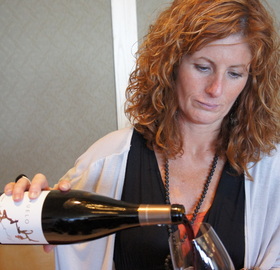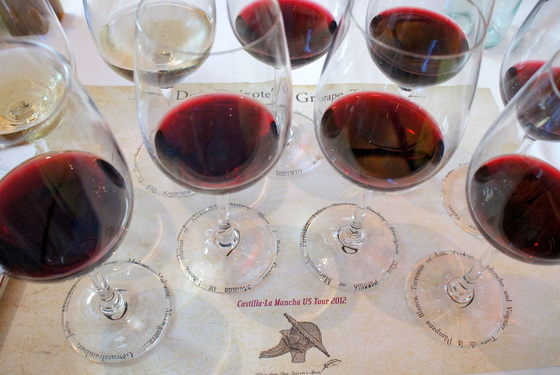 The lady with the red tresses is enologist Rosalia Molina, who, with her husband Manuel, owns a winery that's growing 200 acres of grapes at an elevation of 3,500 feet. (That's higher than any vineyard site in North America.) In the central limestone plateau of Spain, AltoLandon grows French varieties like syrah, malbec, petit manseng and cab franc, alongside garnacha (the French call it grenache), and the widely planted indigenous grape called bobal.
The lady with the red tresses is enologist Rosalia Molina, who, with her husband Manuel, owns a winery that's growing 200 acres of grapes at an elevation of 3,500 feet. (That's higher than any vineyard site in North America.) In the central limestone plateau of Spain, AltoLandon grows French varieties like syrah, malbec, petit manseng and cab franc, alongside garnacha (the French call it grenache), and the widely planted indigenous grape called bobal.
Modern windmills capture nature's energy on the hillcrests beyond the vineyards, where, it's said, Don Quixote once tilted at their predecessors. The ground could be the Rhone Valley of France, strewn with football-size rocks. The denominatin of origin here is Manchuela, part of a grape-growing region, Castilla-La Mancha, that has over one million acres under vine. Warm days, cool nights, and, most important, luminosity: 3,500 hours a year of bright, strong sunlight. The region, outside Madrid, is at 38 degrees N, so it's similar to Sicily and Sacramento in terms of daylight profile, but the high altitude makes all the difference.
Normally, wines from Castilla-La Mancha show more minerality than fruit, but AltoLandon's wines are full of fruit. The wine they call Rayuelo, in particular, explodes with crushed ripe strawberry aromas, wafting from the glass atop a solid base of tobacco earthiness. The bobal grape reaches its best potential in this long growing season, achieving almost unheard of levels of aromatics. AltoLandon's version, blended with fresh, bright malbec, is stunning.
Two more surprising things about this wine. First, if it were available in Washington State, it would cost around $16 (a steal, if you don't mind my saying so). Second, at this writing, at least, it doesn't have an importer.

Leave a comment